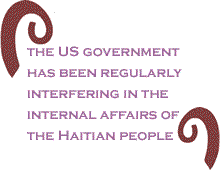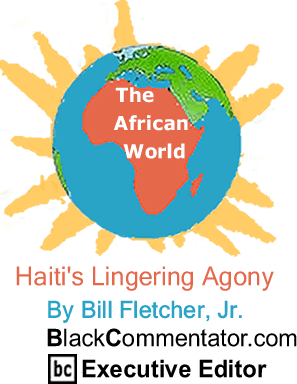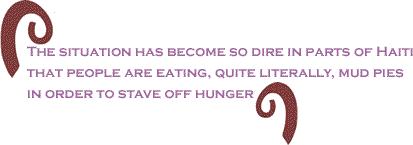Slightly
more than a year ago, a Haitian associate of mine was kidnapped
in Haiti
and, from the looks of it, was murdered. His body has not been recovered
and nothing has been heard from him. Despite significant international
attention to his case, Lovinsky Pierre Antoine, a noted Haitian
activist and leader, an associate of deposed President Jean Bertrand
Aristide, has been “disappeared.”
Lovinsky's
story is not a story of an isolated incident. It has become emblematic
of the ongoing instability on the western half of the island of Hispaniola. News of the continued occupation of Haiti,
gang violence, and the repression of the Haitian people gets little
attention in US media circles. Many of us were led to believe that
with the election of President Rene Preval that all would be right
with the world. That has not come to pass. We continue to witness
tragedies inflicted on the people. Most recently, another food riot
exploded due to the high cost of basic foods. The situation has
become so dire in parts of Haiti that people are eating, quite literally,
mud pies in order to stave off hunger.
Haiti has not been a 2008 US
Presidential campaign issue. I would wager that it has not been
mentioned by either of the major candidates. Yet, the Haitian misery
is a matter that an incoming Administration must address, if for
no other reason than that the most recent episode in this tragedy
can be laid at the doorstep of the USA itself, i.e., the USA
was directly implicated in the overthrow of the democratically elected
president of Haiti,
President Aristide.

A
continued United Nations presence in Haiti, at least through the direct involvement
of Brazilian troops, does nothing to improve the situation. The
Brazilian troops, initially welcomed as friends of the Haitian people,
have come to be viewed as nothing more than agents of the interests
of the Bush administration. Instead of suppressing criminal gangs,
or anti-government provocateurs, they have been used to suppress
supporters of Aristide's political party, Fanmi Lavalas. The UN
presence is an occupation and it is not stabilizing the situation
or rooting out the criminal elements.
 There
is a viable US role in this situation, but not what is usually
suggested. There are major development issues facing Haiti - both environmental
and economic - with which the country will need help. The poverty
of the country has been such that deforestation has been used as
a means of gaining charcoal for the survival of significant sections
of the rural population. A Re-forestation program will be needed
as part of a major rebuilding of the country. This must be accompanied
by a larger plan for economic reconstruction that is based on the
needs of the Haitian people. In that regard, it will inevitably
involve a major role for both the public sector and foreign governmental
support, a fact that goes against the so-called conventional wisdom
of those who follow the line of thought of the International Monetary
Fund, World Bank or the Bush administration. There
is a viable US role in this situation, but not what is usually
suggested. There are major development issues facing Haiti - both environmental
and economic - with which the country will need help. The poverty
of the country has been such that deforestation has been used as
a means of gaining charcoal for the survival of significant sections
of the rural population. A Re-forestation program will be needed
as part of a major rebuilding of the country. This must be accompanied
by a larger plan for economic reconstruction that is based on the
needs of the Haitian people. In that regard, it will inevitably
involve a major role for both the public sector and foreign governmental
support, a fact that goes against the so-called conventional wisdom
of those who follow the line of thought of the International Monetary
Fund, World Bank or the Bush administration.

Haiti's lingering agony should be acknowledged
as also our agony. The USA
has never allowed Haiti
to develop itself on an independent basis. From the time of Haitian
independence in 1804 through the coup against President Aristide
in 2004 on through today, the US
government has been regularly interfering in the internal affairs
of the Haitian people totally unafraid or unapologetic when it came
to destabilizing and/or overthrowing governments with which it disagreed.
 Lovinsky
Pierre Antoine was one of a long list of casualties in this struggle.
I wish that I could say and believe that he would be among the last.
Short of significant changes in US
foreign policy, that is highly doubtful. Lovinsky
Pierre Antoine was one of a long list of casualties in this struggle.
I wish that I could say and believe that he would be among the last.
Short of significant changes in US
foreign policy, that is highly doubtful.
It
must be insisted that whoever is elected to the White House in November,
2008 charts a new path in the relationship with Haiti. Criminal activities
on the part of our own government do not vanish simply because we
no longer hear about them.

BlackCommentator.com Executive
Editor, Bill Fletcher, Jr., is the Executive Editor of BlackCommentator.com,
a Senior Scholar with the Institute
for Policy Studies, the immediate past president of TransAfrica Forum
and co-author of the book, Solidarity Divided: The Crisis in Organized Labor and
a New Path toward Social Justice
 (University of California Press),
which examines the crisis of organized labor in the USA. Click here
to contact Mr. Fletcher. (University of California Press),
which examines the crisis of organized labor in the USA. Click here
to contact Mr. Fletcher. |






































 There
is a viable
There
is a viable 





